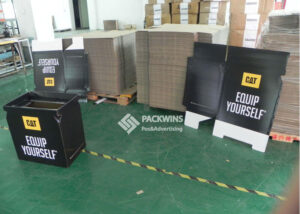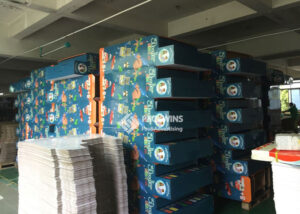In bustling retail environments, your display competes with hundreds of others for consumer attention. To stand out, you need to master the art of strategic design, effective placement, and shopper engagement. This guide explores actionable strategies to ensure your display not only grabs attention but also influences purchasing decisions.
Understand Your Target Audience
Every successful display starts with a deep understanding of your audience. Knowing what appeals to your customers allows you to tailor your design to their preferences and behaviors.
Key Considerations:
- Demographics: What age group are you targeting? Young shoppers may favor vibrant, tech-enhanced displays, while older audiences might appreciate a more straightforward and traditional approach.
- Shopping Habits: Are your customers looking for quick purchases or leisurely browsing? Displays for impulse buys should be simple and clear, while those for long-term engagement can offer more detail.
Actionable Tip:
Conduct surveys or use analytics tools to gather insights about your target audience’s preferences.
Design for Visual Impact
In a crowded store, visual appeal is paramount. Your display should draw the shopper’s eye, inviting them to stop and explore.
Design Techniques That Work:
- Color Psychology: Use bold, contrasting colors to attract attention. For example, red creates urgency, while green evokes freshness and eco-friendliness.
- Typography: Clear, legible fonts with a hierarchy of information guide shoppers effortlessly.
- 3D Elements: Add depth and texture to your display using layered components, props, or lighting effects.
Case Study:
A beverage company incorporated a tropical theme for their summer promotion, using palm tree cutouts, vibrant orange and green hues, and a sand-textured base, doubling engagement during the campaign.
Leverage Strategic Placement
Where your display is located significantly affects its performance. Placing it in high-traffic areas increases visibility and engagement.
Prime Locations:
- Entry Points: Catch shoppers’ attention as soon as they enter the store.
- Aisle Ends (Endcaps): Ideal for highlighting promotions or best-sellers.
- Checkout Zones: Perfect for small, impulse-buy items.
Pro Tip:
Collaborate with retailers to secure premium display spots for maximum exposure.
Embrace Interactive Elements
Interactive displays enhance engagement by encouraging shoppers to touch, test, or interact with products. This hands-on experience builds a connection between the consumer and the product.
Interactive Features to Try:
- QR codes that link to videos or promotions
- Product samples or demos
- Digital screens with customizable options
Example:
A beauty brand used touchscreens to let customers virtually “try on” makeup shades, resulting in a significant boost in sales.
Optimize for Storytelling
Storytelling transforms your display into more than just a product showcase—it becomes an experience. A compelling narrative can evoke emotions and make your product more memorable.
Elements of a Strong Story:
- Theme: Align your story with a seasonal event, like “Back to School” or “Holiday Cheer.”
- Props and Imagery: Use props, photos, or graphics to set the scene.
- Text: Add a tagline or description that ties the story together.
Actionable Tip:
Highlight how your product solves a problem or enhances the consumer’s life as part of the story.
Keep It Simple and Focused
In a crowded store, overly complex displays can confuse or overwhelm shoppers. Instead, focus on one or two key messages or products.
How to Simplify Your Display:
- Use negative space to avoid clutter.
- Highlight a single product or a small, cohesive collection.
- Include only the most essential information, such as price, features, and benefits.
Pro Tip:
Apply the “5-second rule”: Shoppers should understand the purpose of your display within five seconds of seeing it.
Incorporate Sustainability
Sustainability isn’t just a trend—it’s a consumer demand. Displays made from eco-friendly materials like corrugated cardboard appeal to environmentally conscious shoppers.
How to Showcase Sustainability:
- Use recycled or recyclable materials.
- Highlight eco-friendly features with signage.
- Partner with charities or initiatives to underscore your commitment to the environment.
Case Study:
A clothing retailer used 100% recycled cardboard displays for their eco-friendly product line, boosting sales and reinforcing their green brand image.
Measure and Refine Performance
To ensure your display is achieving its goals, monitor its performance and make data-driven improvements.
Metrics to Track:
- Foot Traffic: How many shoppers interact with your display?
- Conversion Rates: How many interactions lead to purchases?
- Customer Feedback: What do shoppers say about the display?
Pro Tip:
Use heatmaps or sales data to determine which display elements are most effective and refine future designs accordingly.
Build a Connection Through Branding
Your display should reflect your brand’s identity. Consistency in branding helps shoppers associate the display with your product, building trust and recognition.
Branding Essentials:
- Include your logo prominently.
- Use brand colors and fonts consistently.
- Add a tagline that reinforces your message.
Conclusion
Maximizing the impact of your display in a crowded store requires a blend of science and creativity. By understanding your audience, designing with impact, leveraging strategic placement, and incorporating storytelling and interactivity, you can create displays that not only stand out but also drive meaningful engagement and sales.
Ready to elevate your retail displays? Contact Packwins for innovative, custom cardboard display solutions that captivate and convert shoppers!



